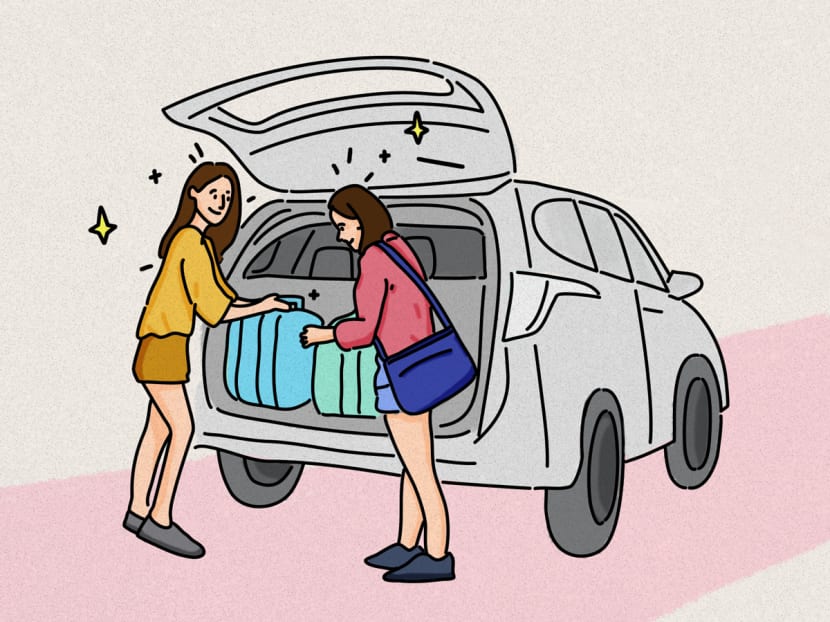Commentary: Is it really okay to ask friends for a ride? Here's why it's important to do favours for each other

When did doing favours for each other stop being a social norm?
On Feb 26, American finance influencer Codie Sanchez posted a tweet discouraging “adults” from asking their friends for a ride to an airport.
“Use Uber, save a friendship,” she advised in the viral post that generated over 25 million views, 2,500 likes and thousands of responses — both in agreement and disagreement.
In the posts and comments agreeing with Ms Sanchez, I was struck to see that so many of us believe we should refrain from extending the simplest, most everyday gestures of kindness to our own friends.
It had me wondering: When did doing favours for each other stop being a social norm?
THE WEIGHT OF EXPECTATIONS
In a previous workplace, a colleague helped me purchase a sandwich from 7-Eleven one morning. In return, I stopped by our usual coffee haunt after lunch and bought her an iced drink.
When she asked how much she owed me, I waved it off.
After all, it was only S$0.99. The smallest of favours.
But she insisted and, the next thing I knew, I had S$0.99 more in my PayLah! wallet.
A few months later, when someone offered to buy me my favourite teh C, I found myself desperate to repay them the S$2 it cost. This is something they wanted to do for me; I was under no obligation to feel indebted.
Even then, I still transferred the S$2.
“You can treat me another day,” I laughed in an attempt to hide my inexplicable discomfort.
I was used to saying “I’ll get you the next round” to friends and family. The practice of writing off a debt immediately was unfamiliar to me — or even the idea of it being considered a “debt” at all.
Why had I suddenly felt this strange pressure to immediately repay this particular gesture?
I later found an explanation in political scientist Robert Axelrod’s "tit for tat” game theory: We tend to reciprocate and mirror an action done towards us, whether positive or negative.
That was the impact the S$0.99 transfer had on me: I suddenly felt like any “nice gesture” from others was an imposition by me on them, one that demanded compensation.
I’LL (NOT) BE THERE FOR YOU
We’ve all been there before, where asking a favour from a friend felt like we owed half our lives to them. Many times, I’ve instinctively said “I owe you one!”, instead of “thank you”.
But it turns out that in general, people want their loved ones to “bother” them, showed a 2022 study published by the American Psychological Association — even though those reaching out may feel the gesture is insignificant.
Clearly, it’s important to us to give freely to those around us.

The problem is that the capitalist nature of our lives encourages us to view our very selves as a collection of practical resources to be carefully expended.
Take time, for instance. How often have we heard that we should be “maximising” our time? So many self-help resources online are about optimising the “5-9” (our time away from work) as best as possible for “productive” endeavours, such as creating a healthy routine.
Anything outside this realm — helping a friend run an errand, for example — might detract from or deter our journey towards personal growth or achievement.
On top of that, with so much automation and convenience around us, we have the perfect excuse to avoid helping our friends in ways that used to be commonplace, and instead suggest services that would do the same at a monetary cost.
CONFRONTING MAIN CHARACTER SYNDROME
With mental health awareness now at the forefront in many aspects of life, we’ve all heard the rhetoric that our personal needs should come first. But have we warped this idea a little too far beyond the original intent of self-care?
To be clear, we all need boundaries. Some of these include not being available to our friends after a certain hour, or limiting the emotional support we can provide regarding burdensome or triggering topics.
However, we seem to have forgotten that boundaries are meant to protect us from unhealthy situations, not prevent us from investing in healthy bonds with others.
We need to be careful that our boundaries do not block us from connecting with those we care about — that “self-care” doesn’t become self-centredness.
In The Art of Loving, German social psychologist Eric Fromm stated: “Love of others and love of ourselves are not alternatives”.
Helping others does not have to come at the cost of our own mental well-being. In fact, when we extend kindness and favours towards others, it can actually alleviate our own symptoms of depression and anxiety, and improve our overall mental health, reported a study published in 2023 by the American Psychiatric Association.
REVIVING SINGAPORE’S KAMPUNG SPIRIT
Speaking as a Gen Z-er, as much as baby boomers may not understand us on many different principles, there was one thing they got right: Creating communities.
The “kampung spirit” of older Singaporeans fostered togetherness and support, which has stood the test of time until today. While many of today’s youth readily avoid orientations or water cooler conversations, boomers are less likely to shy away from gathering together, as understood from countless stories of flourishing community involvement programmes for the elderly.
Baby boomers are also more likely to help those around them, knowing that that gesture might not ever get repaid. A 2017 National University of Singapore study showed that the older Singaporeans are, the more inclined they are to volunteer, with senior citizens particularly generous with those who are socially distant.
Growing up with my grandmother, I watched her befriend so many of our neighbours and regularly checked in on their and their family’s well-being. Many of these neighbours, I never knew personally — but they would look out for me in the community because of my grandmother.
Have we let Singapore’s kampung spirit become a relic of the past?
The answer is not yet set in stone — but as we continue to see rising levels of isolation and loneliness, it’s clear that we need to find new ways to support each other, beginning with our friendships.
If we want to lay down a foundation of authenticity and trust in our social bonds, we need to be willing to extend kindness to others without requiring or expecting any reciprocation other than gratitude — and also to accept them in kind. Doing favours for our friends isn’t just about putting in effort or going the extra mile — it’s about creating opportunities for pure human connection.
Perhaps kickstarting this cultural reset can be as simple as offering a friend a ride to the airport.
ABOUT THE AUTHOR:
Larissa Santhana Nair works in communications with a focus on marketing, public relations, and brand management.






